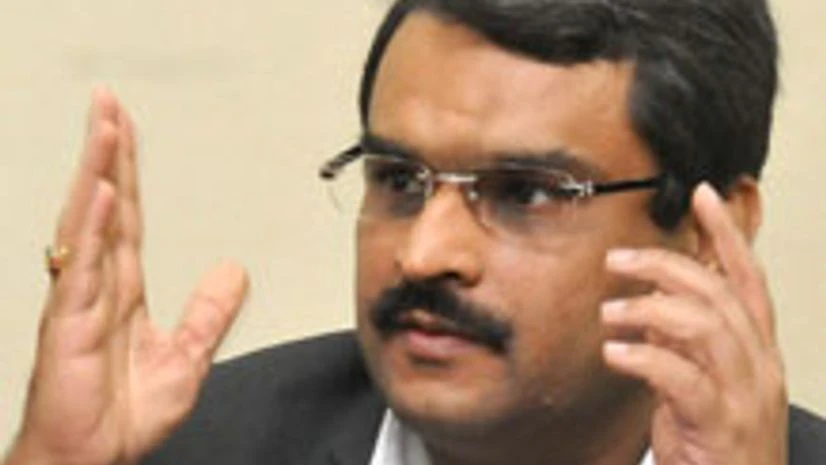Jignesh Shah made Financial Technologies India Ltd (FTIL) what it is today. And, it is FTIL that made Shah. For him, it opened the doors to India's financial corridors and gave him a wild card entry into the country's exchange business, which he went on to dominate briefly.
Anchored in its trading platform business, Shah angled for the biggest catches in the exchange business from Singapore in the East to Dubai and Mauritius in the West. Shah and FTIL first became the darling of what was then the new kid on the block - the National Stock Exchange - when it was fighting to gain market share from BSE. Eventually, they would fight each other in courtrooms and dealing rooms.
To step out of the mother ship and be reduced to the titular role of chairman emeritus and a name for an award - JS Digital Innovator Award -wouldn't have been easy for Shah. He might have taken this step to avoid the ignominy of being thrown out forcibly by the government, as was the rumour in the corridors of power. Also, this might take the sting out of those out to get him in the government and outside and help him focus better on the multiple legal proceedings he faces. The release did not offer any insight into the exact trigger for the decision.
Also Read
About a year ago, Shah had done something similar, stepping down from the helm of the Multi Commodity Exchange (MCX). At that time, he had rightly guessed the Forward Markets Commission would declare him not fit and proper to run the bourse a month later.
In a month, the entity Shah left on Thursday faces a contentious merger process with its scam-hit subsidiary, the National Spot Exchange Ltd (NSEL). As is the case with its end, its beginning also was in a merger - it was a product of a reverse merger transaction with another listed entity originally floated by another entrepreneur based in Thane, C Subramaniam (Mani to friends).
In 1987, Subramaniam, along with partners S Anand and N Muralidharan, set up Worldwide Technologies, which manufactured modems. With the primary production unit in the Madras Export Processing Zone, Chennai was the natural choice for the company's registered office.
In the early 90s, Shah ran a company called Jignesh Consultancy Services. "They were system integrators. They were selling our modems. That's how I came in touch with Jignesh," Subramaniam had told Business Standard last year.
According to an oft repeated story in the media, Shah, his former BSE colleague Dewang Neralla and a couple of others worked out of a mezzanine floor office near Horniman Circle in south Mumbai; they wrote codes to manage the order flows of brokers. The order management system they created, ODIN, would come to dominate the market in subsequent years.
In his farewell note, Shah recalled his lofty ambitions, even during the days of his humble beginning. "When we started FTIL, we had only one vision - to make Indian technology IP and brand among the most respected in the world, which not just delivered shareholder value but created social impact in terms of job creation and benefited the ecosystem."
In early 1995, Subramaniam took Worldwide Technologies public, raising about Rs 2.25 crore.
In the late 90s, the modem business became more of a commodity business, as people started importing goods from Taiwan and other east Asian countries. Subramaniam sought an exit and, using a de-merger rule introduced when Yashwant Sinha was finance minister, he split Worldwide Technologies into two listed entities. The software services division was spun off into a company called Nods Worldwide. This company had share capital of Rs 3 crore and assets of Rs 3 crore.
Around this time, Shah had two different entities -Electronic Broking Services and Financial Technologies India Private Ltd (FTIPL). Subramaniam said Shah was planning an initial public offering for FTIPL and he offered him a reverse merger plan.
At that time, reverse mergers were popular, as these did away with the uncertainty of the book-building route. It also gave promoters better control over the shareholding pattern, Subramaniam said. Therefore, Nods Worldwide was first merged into Electronic Broking Services and, at the second stage, FTIPL was reverse-merged into this new entity to form the modern day Financial Technologies.
A year ago, when he stepped down from MCX, Shah had stated he would look at the progress of the bourse he founded from a distance. He went on to sell it to the Kotak group. As he stepped down from his first and last fortress, he said, "Today as we pass the baton to the new generation of leaders of FTIL, that vision remains unchanged as we move to the next trajectory."
FTIL put up a brave face, saying the company would now look to implement Shah's vision of Digital India 2025. The new generation of leaders Shah refers to will have to punch above their weight to achieve that, as FTIL already faces shrinking revenues. Its former subsidiaries have reworked or cancelled its lucrative technology agreements and the Securities and Exchange Board of India's moves to diversify the technology provider market have eroded the near-monopoly ODIN once enjoyed. Gradually, it has lost several subsidiaries in India and abroad, and the one subsidiary it doesn't want threatens to wipe out the reserves on its balance sheet. FTIL and its new leaders will miss the "Jignesh's indomitable spirit" Chairman Venkat Chary referred to in the press release.
From leading every space they entered, Shah and FTIL have lost almost everything. But nothing would have hurt them more than losing each other.

)
